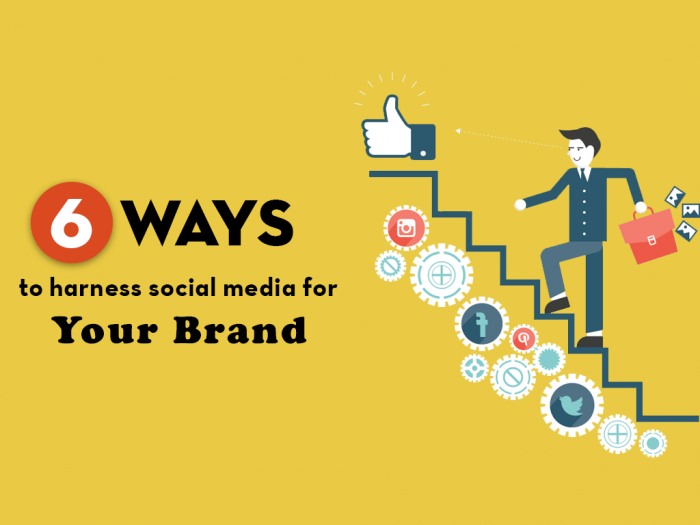Blog
6 Ways To Harness Social Media For Your Brand

Social media has become a constant in modern daily life. By now it’s not uncommon for grandparents to have their own profiles on Facebook. This means that marketing on social media is beginning to have less limits on possible target
demographics, and increasingly greater reach as the number of users on major social media sites rises.
That said, the social media marketing realm is as dependent on constant change as the social media landscape itself. Designing a successful online brand depends not only on compelling ideas, but equally on adaptability.
Without a dynamic brand, users of new and up-and-coming, or even outdated social networks will be outside the reach of your brand. This is why understanding a few different aspects of the current social media landscape is key to online
marketing success.
1) Social commerce, or sCommerce.
Integrating online shopping and ecommerce into social media has been the logical next step for a long time, but it is only recently that has been done well and
reached mainstream levels of adoption. People are now used to the idea of making purchases through their smart phones or tablets, beyond just buying new apps, software, or similar digital items.
Including a web-based sales component can encourage both sales and engagement. Selling a branded t-shirt, for example, is one straightforward way to integrate commerce into social media. With Twitter adding a “buy” button, and other
social media sites following suit, this will soon be easier than ever before.
Commerce options don’t have to be limited to any one realm of social networking — sales are not only possible through Facebook and Twitter, but is easily integrated into a site with one of many available web-store-building platforms.
If you don’t already have a physical product to sell, it’s worth considering — promoting it on social media should come easy after that.
2) Agility isn’t an option anymore, it is essential.
The days of long waits for approval and multiple chains of command are over — for good. The speed of the social web means that marketers need to be empowered to act quickly and respond to relevant current events in order to be successful. And their bosses or managers need to trust them; and give them the freedom to execute spontaneous or agile marketing campaigns.
Agile marketing means adapting marketing campaigns to sudden, brief trends, or hyped-up topics on social media. While this seems ultimately hollow in the grander scheme of things, making an effort to stay up-to-date even with fleeting
trends will pay off in the level of fun perceived engagement your brand will demonstrate. These are two characteristics your customers will enjoy especially.
Not many people remember the blackout during the 2013 Superbowl, yet blogs are still writing about Oreo’s ad placed as a direct response to this. The key to success in this case is clearly not content, but response time and relevancy.
These factors successfully made an okay tagline into something great.
3) Content is king.
And long live the king. Content marketing has been an important part of online marketing for years, but its value continues to increase – and it is hardly something that anyone in the online advertising world can afford to ignore anymore. Creating the type of content — whether it is a blog post, video, images, infographic, social media post, or anything else — that inspires users to pass it on to their own social networks is quickly becoming the most important method of marketing in general.
Before creating your own content, it’s worth noting what’s being shared most on sites like Buzzfeed or Upworthy. These sites, along with a few others, have mastered the art of creating viral content.
You, of course, would like your content to go viral. Competing against everybody else online with this same goal will make it tough, but content goes viral for a reason. It’s something people not only want to see, but want to show
other people. Paying attention to the things that are already being widely shared, and trends across each of these items, should provide a snapshot of characteristics that inspire people to share, and can give you a great starting
point.
4) Private messages = 1-on-1 marketing communications.
Private messaging on Twitter, Facebook, Snapchat, Whatsapp, and many other platforms are something that most marketers have yet to take advantage of, except perhaps for direct messaging customers who could be posting sensitive info or otherwise need a 1-on-1 follow up.
However, given the latest tech launches and popular platforms, users are starting to expect more of a custom experience even when communicating with huge brands. And community managers and other marketers need to understand and take
advantage of that, by offering their own personalized interactions.
Certain functionalities of these platforms allow for privately targeted messages to benefit the public. Take, for example, the numerous “funny” responses left by major brands on Facebook. Don’t be afraid to have a sense of humor, either.
Address your customers’ needs first, but if you go above and beyond, your audience will pay attention.
5) Mobile payments via branded platforms.
Allowing your customers to interact with your brand on mobile is the first step; whether it is through your own app, a third-party application, or simply a mobile browser. Furthermore, if it is applicable (e.g. you already have an
ecommerce presence or sell products online), setting up mobile payment options can be a huge convenience to your customers.
In fact, being able to buy online can help you build a more solid and lasting relationship with your existing and future clientele. Almost everyone appreciates the convenience.
6) Understand the changes that social media has brought about.
The speed at which the social media world moves can be dizzying; and at times, it may seem like that all you can do as a marketer is keep up. However, that’s not enough. Being ahead of the trends and innovating yourself can be what
makes all the difference for your company, or the brands you work on.
New digital technologies are making starting your own business easier than ever.
Source credit : 6 Ways To Harness Social Media For Your Brand

